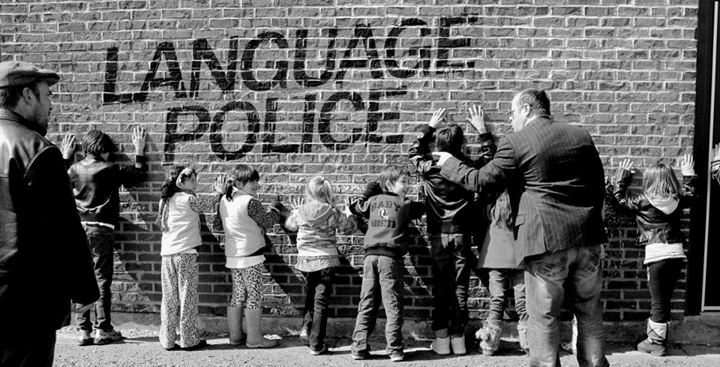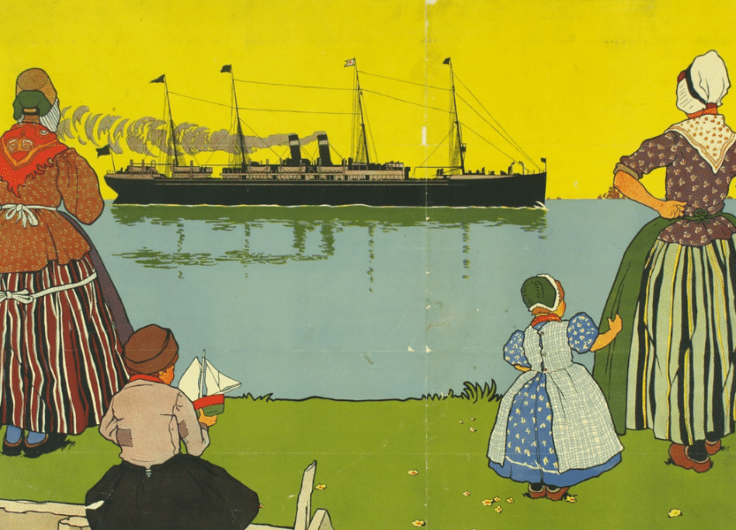Bring on the Language Police!
Words become outlawed, and people with different opinions soon accuse the other party of engaging in ‘framing’: presenting a subject in a subjective way by using language that evokes specific associations. Are the language police just round the corner? According to the Dutch linguist Marc van Oostendorp it won’t come to that.
The word neger (Negro) is still to be found in the Van Dale dictionary. There were occasional vehement protests against this at the beginning of this century – in 2002, the Stichting Eer en Herstel Betalingen Slachtoffers Slavernij in Suriname (organisation for compensation for victims of slavery in Surinam) threatened to burn fifty copies of the dictionary on Dam Square in Amsterdam if its publishers continued to persist in their lexicological duty. The action was called off and the word remained where it was, though with the addition of the comment: ‘obsolescent term, sometimes associated with exploitation and slavery and therefore experienced by some to express contempt’ (Van Dale online, paying version, January 2019).
In these few words, the editors’ explanation summarised the dilemma that this sort of debate leads to. The word neger is becoming obsolete and it does make some people think back to the period of slavery. The word ‘some’ at the same time implies that not everyone makes this link. There are also language-users for whom the word is an innocent label for people with a dark skin colour. Should they now allow themselves to be limited by the ‘some’ who do experience the affront?
Have the language police arrived? You occasionally hear that they have, but they are at most a police without badges, truncheons and speed cameras. You can of course be fined for libel or defamation, but to my knowledge this has never happened to anyone for using the word neger, and definitely not if they used it with no offensive intention. There are no other penalties for using the wrong words.

The term ‘language police’ is reminiscent of the fictional world described in the novel 1984 by the British journalist and author George Orwell (1903-1950). In that world, certain words are forbidden by the governing party to prevent people from thinking of the concepts they express. For example, ‘freedom’ ultimately has to be eliminated, being a superfluous notion, because according to their particular ideology freedom is not desirable.
In Orwell’s book there are no actual ‘language police’, but there are ‘thought police’, because the Party is interested not so much in lexicography as in the way its members see reality. Changes of language are only a means to this end.
Power Balance
Although in today’s world there are, as far as I have been able to establish, no language or thought police in the literal sense, the ideology adhered to by some advocates of modified language does, according to their opponents, possibly come very close. What they want to achieve by a change in the language is that people think differently about a subject.
This idea was formulated explicitly by journalists on the Dutch website OneWorld.nl, which in July announced that it would ‘stop’ using certain terms (such as ‘indigenous’ and ‘developing countries’) because they were ‘too colonial or patronising’ and because ‘language determines the image formed and negates or endorses power relations’. This is in any case a view of language also held by the authorities in Orwell’s novel – that the choice of words can have an effect on the balance of power.
However, OneWorld has not set up any language police, as some opponents claimed, but made its own editorial decision concerning only texts it publishes itself. They did not urge the government to make the use of the term ‘developing countries’ an offence, let alone set up a group of police to knock on offenders’ doors in the dead of night. They simply announced that they would themselves no longer be using this term, in the hope of finding supporters.
Emancipation
Any fear of the advent of language police is thus unfounded. Even among the most extreme champions of emancipation and equality I have never heard any arguments for this sort of institution. Instead, various groups occasionally use the platform of this or that medium to say that they are adapting their own language, often arguing that the existing choice of words is offensive. In 2016, the Rijksmuseum in Amsterdam announced that it would be modifying such words as ‘Eskimo’ and inlander (native) in the descriptions of paintings. A couple of years later, the manufacturer of negerzoenen
(negro kisses) said that it would be changing the name of this product to zoenen (kisses), possibly for purely commercial reasons; in any case the fuss about the name-change appears not to have done sales of this sweet any harm.
Those who want to change society appear to reach very quickly for the dictionary and the correction pen
But why then is there so much debate about modifications of language use? I think there are two reasons. In the first place we live at a time when a great many minority groups are simultaneously claiming their rights in public life. What’s more, the internet makes this easier for them. When they are upset by certain terms, relatively small groups can make themselves heard much more easily than thirty years ago.
Secondly, the belief that it is possible to combat social injustice by means of the language is evidently widespread. Those who want to change society appear to reach very quickly for the dictionary and the correction pen.
I find it hard to imagine that anyone thinks it’s not a good idea that a large number of people can make themselves heard and achieve emancipation. So the most important question is: are they right when they think that they can get closer to their ideal by trying to ban a certain word?
Colour Differences
The notion that language can influence thought is known as the Sapir-Whorf hypothesis, after the American linguistic pundits Edward Sapir (1884-1939) and Benjamin Lee Whorf (1897-1941). In fact the notion that there is an influence is the so-called ‘weak’ variant. There is also a ‘strong’ variant that states that language determines thought entirely, but I have not yet met any serious researcher who adhered to this ‘strong’ version – even Sapir and Whorf themselves appear to have preferred a more moderate interpretation.
The ‘strong’ version is indeed very strong. For example, how would the editors of One World ever have come up with the idea that the term ‘developing countries’ had an unfavourable connotation if they themselves use a language that includes this term? How is it possible that even anti-racists use the word neger, even if only to express their abhorrence of it? The ‘strong’ version is called linguistic determinism and has a rather sombre world-view, which is that all our thoughts are definitely determined by the way we think. In that case, individuality is impossible – you cannot escape the way of thinking imposed by your native language – and it is also hard to imagine how language itself can ever change. After all, for this it would be necessary for someone to have an idea that lies outside language.

So the debate is more about the ‘weak’ version of the Sapir-Whorf hypothesis, which is sometimes also called linguistic relativism and which states that language does not determine, but does influence our way of thinking. Some evidence of this relativism has been found in the course of the past century, for example in linguistic experiments. There are for instance languages that only have one word for blue and green. Speakers of those languages appear to have very slightly more trouble matching blue with blue cards and green with green in a psychological laboratory than speakers of languages that do distinguish between blue and green. They can do it – it is not that they do not see the difference at all, just as we also see differences between tints of green for which we have no name – but it takes them just a little longer, possibly partly because during the experiment they can rely on the names of the colours: ‘this card is ‘blue’, so that’s where it belongs’.
This experiment counters strong determinism: people recognise colour differences that their language does not provide for. This does perhaps give an indication of a very relative form of relativism.
Not uniformised
Yet the attempts to adapt language to new social sensitivities are not always pointless. It is apparent from the word ‘mansplaining’ that there is more to be said on the subject. This word of American origin – which refers more or less to what a man does when he explains something to a woman who actually knows more about the subject than him; how she should practise her profession, for example – has been increasingly used in the Low Countries in the last couple of years. ‘Mansplaining’ indisputably refers to something that had already existed for a long time. My experience is that most people, or at least most women, start laughing when they first hear the word – a laugh of recognition.
So the word does not suddenly bring the phenomenon into existence – otherwise you would not recognise it – nor does it give women the idea that what they are experiencing is unpleasant. Yet the new word does change something. A particular collection of experiences all at once becomes a ‘category’. It is much easier to talk about the phenomenon because there is a word for it, and not only that: you can think about it more effectively, because you can relate various experiences to each other.
The world is like a thick porridge where everything merges into everything else
The world is like a thick porridge where everything merges into everything else. Language can provide you with spoons to take samples of the porridge. A word helps you to take a specific extract from reality so that you can reflect on it better and talk to each other about it more easily. In this sense, words are therefore really important in the way we experience the world and how we change it.
The important thing about this sort of example is that it concerns new words that are being added. These new words equip us with new categories. This does not necessarily mean that the opposite also has the reverse effect – that you can eliminate a category of thinking by no longer using a word. It is not even clear whether, as long as all your compatriots have not been persuaded to follow your example, you can really get rid of a word by no longer including it in the dictionary or even by no longer using it.
So as far as this is concerned, there is little hope for those whose ambition it is to act as uniformed language police.
Associations
Nevertheless, there are reasons for handling your language with care. All these reasons are linked to the fact that words not only have a meaning, but also associations. When you hear the word ‘red’, the words ‘fire engine’ and ‘strawberry’ also spring to mind. You are not usually aware of this, but at the mention of red you do always think very briefly of that fire engine.
In recent years, the theory of ‘framing’ as conceived by the American linguist George Lakoff has become popular among both cultural analysts and political thinkers. The theory is that you can make people see a subject in a specific way by the way you present it in language. By talking about ‘tax relief’, you give people the idea that reducing tax is a ‘relief’, and is therefore something that can only do good. As a result, the fact that this relief also means that there is not enough money for such public services as nursing and the fire brigade is more easily forgotten.
In my opinion, the examples raised by OneWorld come into this category. What is important is not that we deny the classification of ‘developing countries’, but that we do not always want to suggest that these countries are in need of development. And every time you say ‘developing country’, a lamp lights up that indicates a backward people just waiting for the do-gooders from the West.
The other reason for taking care over the words you use is of course politeness. The word neger evidently arouses negative associations, even though this is according to Van Dale only the case for ‘some people’. A concern for ‘some people’ may be a reason to abstain from using this word, even if it does not have any unpleasant associations for you yourself. These associations too can of course also change: forty years ago I learnt from my mother that nikker was a very nasty word and that I should therefore call our neighbours from Surinam negers. In the meantime I find that word itself unacceptable too, and the debates of the last few decades have definitely had something to do with that. Not because I have become rationally convinced, but because I have obviously adopted the feelings of those I converse with.
It is of course not always possible to handle it well. For example, there has been a long-running argument about whether you should call a female director directeur or directrice. For most people the word director is associated with men. You can try to change this by expressly calling women directeur too. Or you might think that by using directeur
for women that they remain invisible and so you opt for directrice. Using either of these strategies you can offend people who are aiming for the same thing as you are. That’s the problem with all changes: they never take place in such an orderly fashion that the individual never makes the occasional mistake.
Reassuring
In any case, there is no prospect of language police; at most there are attempts by some to try to formulate things slightly differently. In this regard, it is important to understand that people who use the term ‘language police’ are themselves trying just as much to shape reality by the use of certain words. The word ‘police’ evokes associations of big men banging on the door because you may have done something wrong, as a consequence of the authorities’ meddling with matters that hardly concern them. In this way they try to manipulate their listeners by means of language.
Their chance of success is just about the same as that of their opponents. Because the only successful manipulation of someone else’s thinking is done through association, and, because these associations are extremely difficult to bring under control, and despite all the manuals that promise you can learn how to ‘frame’, it is extremely hard to predict exactly how you should set to work.
This is a reassuring thought: people cannot very easily be manipulated through their language. As long as the term ‘language police’ remains a metaphor, we are quite happy for them to come knocking at the door.












